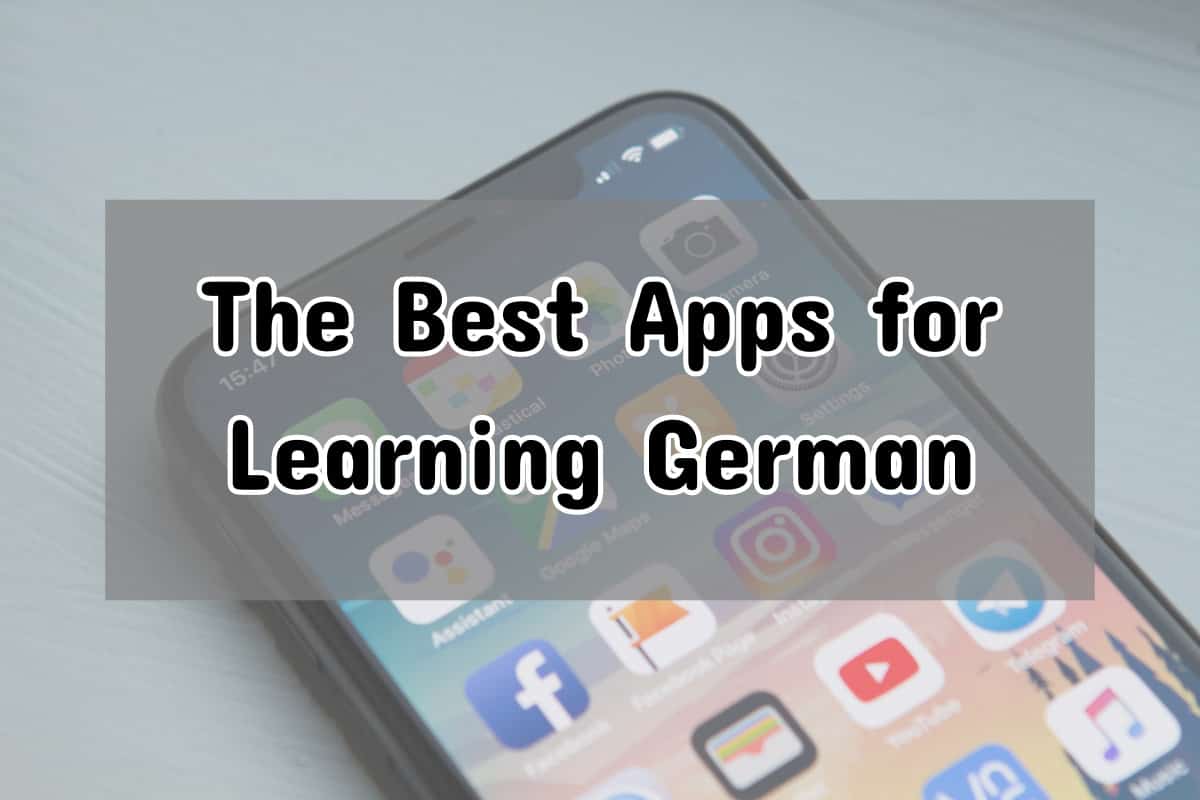If you’re looking for apps to learn German, look no further. Whether you intend to travel to Germany, study for a CEFR exam, or brush up on your German literacy, you can be sure there’s an app to help you. In the past, resources for learning German were limited. These days, however, tons of free and paid apps can help you master German incredibly quickly.
In this article, we’ll provide an overview of the top German apps available to try. Some of these apps provide full courses for the German language, and other apps focus more on reading and writing German, or improving your German vocabulary.
Can you learn German with an app?
Yes and no.
There is no single book, course, or app that can provide you with everything you need to learn a language.
So, while you can learn German with an app, it won’t be the only thing you need to become fluent in German.

In the end, the best way to learn a language is to interact with it, so while an app is a great place to start, don’t expect it to be the only tool you’ll need.
Why learn German with an app?
Apps are a great way to start your language learning journey for several reasons:
Gamification
The process has been fine-tuned in most apps to make it as simple and enjoyable as possible while covering some of the most important topics.
Each app takes a different approach, but regardless of which app you use, you will learn German.
A low entry fee
One of the most appealing aspects of learning through an app is how simple it is to get started.
Most apps are either free or offer a free trial, so you can always try them out to see if they’re right for you.
Expertise
Though learning through an app may appear to be simple, most apps employ a large team of linguists and language learners who ensure that the content you are learning is useful.
Though some of the phrases may appear strange, they have been considered by others.
The randomness of some sentences can help you think more deeply about what you’re saying rather than writing on autopilot.
What to Consider When Choosing a German Learning App
Shopping for an app is not much different from shopping for a car or a coffee machine. There are just so many options in the market that you’re bound to get confused and annoyed if you start looking without first having an idea of what you’re looking for.
That’s why it’s so important to consider your budget, level, and priorities before you go app hunting. Consider these factors:
Usability: Check out the app reviews to see if the program’s a joy or a pain to use. Some apps are also available offline if that’s something you need.
Learning actively: A german language app shouldn’t be just a dead and dull translation tool. A good learning app, regardless of its key learning goals, should encourage you to think. This could be in the form of games, or simple question-and-answer.
Levels: Preferably, you should be able to choose settings that correspond to your level. This helps to keep your learning structured, prevents you from getting overwhelmed (or underwhelmed), and inspires you to improve.
The best app to learn German in 2024
The best app to learn German is Rocket German. It provides a comprehensive German course that takes you from complete beginner to conversational. It helps you build vocabulary, learn the most important grammar, and practice communication in every lesson.
20 best apps to learn German in 2024
- Rocket German
- Mondly
- Babbel German
- Pimsleur
- GermanPod101
- Duolingo
- Fluenz
- Brainscape
- 14,000 Deutsche Verben
- Der Die Das
- Rosetta Stone
- HelloTalk
- Busuu
- Speechling
- Chatterbug
- italki
- Memrise
- AccelaStudy App
- MosaLingua
- Anki
Rocket German
This German course from Rocket Languages is one of the most comprehensive full-course German language apps in this section.
Rocket German might be the best app to learn German if you want to be carefully guided through the learning process, but this app is somewhat more expensive than its competitors.
Rocket German features impressive dialogue sections that help you prepare for speaking German with native speakers. This app also includes gamification features and leaderboards that inspire you to do your best. Unfortunately, the Rocket German community/forum could be more active and they could improve the course a lot by adding video.
Rocket Languages offers its language courses in tiers. Tier I Rocket German costs $99.95, Tier II costs $249.90, and Tier III costs $259.90. Rocket German is offered as a one-time purchase instead of as a subscription.
Mondly
Mondly is a unique language app that incorporates augmented reality (AR) and virtual reality (VR) components.
While Mondly is one of the most intriguing full-course German apps, some of its features seem unnecessary, and this app focuses mainly on low-level language learning.
You might find it easier to learn German with an AR teacher in your office or when you’re fully immersed in a VR cafe setting. This type of learning isn’t for everyone, however, and certain aspects of this language app, such as its chatbot, seem more gimmicky than useful.
There is a free version of Mondly, and paid subscriptions start at $9.99 per month. You can also purchase an annual Mondly subscription for $47.99.
Babbel German
The Babbel app delivers high-quality German course content that is ideal for students who need an edge before starting an in-person German language course or who want to supplement traditional classroom materials.
The Babbel app gives students access to content that focuses on listening, speaking, writing, and reading German. The software features voice-recognition technology and interactive dialogues to promote the fast acquisition of conversational skills. The Babbel app offers no opportunities to interact with teachers or other language learners to improve conversation skills in real-life scenarios. Also, its fill-in-the-blank exercise structure can be dull.
Access to course materials through the Babbel app is subscription-based. A student can sign up to learn German through the Babbel app for a fee of $6.95 per month when he or she signs up for a year’s worth of access.
Pimsleur
The Pimsleur app is one of the best apps to learn German. It delivers a comprehensive German learning course to students using Pimsleur’s famous auditory format. Dr. Paul Pimsleur developed the Pimsleur language learning method based on the way that children learn their native languages. By doing listening exercises, German language learners unlock the keys to fluent speech in shorter periods.
The app works well for students who want to focus on speaking and listening comprehension. The company recently added visual content and game-like quizzes to support different learning styles. Course materials seem outmoded to some users compared to the courses that competitors offer.
The advertised price for a subscription to Pimsleur’s German language learning app is $19.95 per month.
GermanPod101
GermanPod101 offers students thousands of podcast-style lessons that are based on students’ learning goals.
Audio and video podcasts feature native German speakers. Watching and listening to these tutors help a lot with pronunciation. Video production quality isn’t consistent throughout the course. Newer lessons give students a better user experience; older lessons need to be redone. The course also doesn’t cover grammatical instruction well.
There is a free version of the ermanPod101 app, and there is a subscription version that ranges in price from $4 to $23 per month. The pricing is based on a 24-month subscription period.
Duolingo
The Duolingo app offers a course for German language students that includes hundreds of short, personalized lessons. Before getting started, the app asks students these questions to customize the learning experience. – Reason for learning German – Weekly time commitment for the course – Experience level with the language According to the company, 34 hours of Duolingo study equates to one semester of an in-person language course.
Duolingo strives to make language learning fun and accessible to everyone. The app’s German language lessons are designed as games that offer challenges and rewards as one passes certain learning milestones. Contributors of the course realize that students learn differently. The app allows students to access special Duolingo features such as interactive stories, in-person events, and podcasts that help with speaking, reading, and listening comprehension. While Duolingo app users praise the tool, they admit it won’t make a beginner fluent in German on its own. Also, the Duolingo app course doesn’t follow the Common European Framework of Reference (CEFR) for languages and doesn’t issue proficiency certificates.
The Duolingo app is free. Duolingo Plus, which is the company’s paid version of the course, costs $9.99 per month. It includes ad-free lessons and allows users to download course materials for offline use.
Fluenz
The Fluenz app is a comprehensive German language learning tool that supports beginners and advanced students. Fluenz app courses blend content that focuses on speaking, reading, writing, and listening comprehension in a digital environment that mimics a traditional classroom-style setting.
The instructor-led video productions are of high quality. They offer the right amount of repetition and pronunciation help to make the Fluenz app worth considering for beginners. Fluenz courses come in five levels. The first level is the easiest, and the fifth level is the hardest. The content is not customizable.
A learner can skip lessons to get to more challenging work, but there isn’t a way for a student to test out of a block of lessons. Experienced German language learners have trouble knowing where to start taking lessons.
Course materials that one accesses through the Fluenz app range in price from $187 to $408. A student who wants access to only Level 1 course materials pays a one-time fee of $187. If the student wants access to all five levels, he or she will pay a one-time fee of $408.
Brainscape
Using proven scientific cognitive research, Brainscape delivers faster learning with its flashcard-based German vocabulary and verb courses that users can access through its app.
The Brainscape app features a learning algorithm that allows students to access progressively more challenging verb conjugation and vocabulary flashcards based on their proficiencies. The Brainscape app doesn’t focus on speaking German in real-world conversations but concentrates on grammatical instruction.
There is a free version of Brainscape that gives students basic access to its flashcard content. A premium version of the app is $4.99 per month based on yearly billing, and one can get lifetime access to premium membership content with a one-time payment of $129.99.
14,000 Deutsche Verben
The 14,000 Deutsche Verben app is a German grammar tool that conjugates over 14,000 verbs in all tenses.
The app allows users to customize a favorites list of verbs for targeted conjugation study. It comes with a voice feature that gives the correct pronunciation of the verbs in all tenses.
Students can use the app without an internet connection. The ads that display while using the app online are annoying, and there is currently no ad-free, paid version of the app. The 14,000 Deutsche Verben app is free.
Der Die Das
The Der Die Das app is a leading German-language learning tool for noun and article instruction.
The dictionary format of the Der Die Das app helps students to quickly search for articles by typing in specific nouns. The app also features game-like quizzes that reinforce the memory of noun genders and associated articles. The app doesn’t provide usage examples in sentences that allow students to learn nouns and articles in context.
The Der Die Das app is free. An ad-free version of the app costs $1.99.
Rosetta Stone
The Rosetta Stone app gives students access to one of the most comprehensive German language learning tools on the market.
The app brings lessons to students that are based upon common themes such as business, travel, and everyday life. For a fee, students can get one-on-one tutoring with a teacher. The app’s software doesn’t support all learning styles such as kinesthetic learners.
The price of the Rosetta Stone app ranges from $6.99 to $11.99 per month depending on the chosen subscription period. One can get lifetime access to Rosetta Stone’s German language learning software through its app for a one-time fee of $199.
Read: Best Ways To Learn Hebrew In 2024
HelloTalk
The HelloTalk app isn’t one of those typical learn German apps. It’s a global language exchange app that is designed to give German language learners a richer experience.
With this app, German language learners put vocabulary words into action with the help of native German speakers. Students get accurate pronunciation corrections in real-time from German peers who volunteer for live conversations. The app doesn’t include structured lessons or other language-learning tools. It isn’t designed to be a stand-alone language learning tool. The HelloTalk app is also free.
Busuu
The Busuu app combines powerful German language-learning content with some of the features of language exchange apps. The app works well on its own to improve German language students’ proficiency. However, the Busuu app gives maximum benefit when it’s used with formal, in-person courses.
The Busuu app gets German language learners closer to fluency with exercises that support real-life conversation and not just vocabulary recall. The Busuu app is a serious German language learning app that doesn’t include many entertaining games to keep students’ interests high.
The basic version of Busuu that a German language learner can access through the Busuu app is free. The premium subscription comes with more content, features, and a fee.
Speechling
The Speechling app begins German language learning with sentence repetition but encourages more freestyle conversation as the lessons progress.
The app allows students to use German vocabulary and grammatical instruction to creatively string together sentences to describe actions in flashcard-style pictures. Students have the option to record verbal answers and get feedback from native German speakers. The Speechling app is not for beginners, and it’s best used with other German-language learning tools such as a translation dictionary.
The basic Speechling app is free. It comes with at least 15 hours of feedback for recorded speech.
Chatterbug
The Chatterbug app instructs German language learners through grammar and vocabulary exercises. Students can test knowledge with live lessons with native speakers through the Chatterbug website.
Chatterbug has extensive vocabulary and grammatical exercises for self-study. Live sessions, which are one-on-one video chats with native speakers, aren’t currently available through the Chatterbug app. Students can access these live sessions through the Chatterbug website.
Subscription prices for German language learning content that students access through the Chatterbug app and the website start at $18 per month.
italki
The italki app brings German language immersion to students’ doorsteps. The app allows students to take lessons from German teachers and converse with German language tutors to improve conversation skills.
italki German app offers students a convenient and effective path to fluency using video lessons with live German teachers and tutors. This app is one of the pricier options for German language learners.
Students pay per lesson. Rates generally start at $10 per lesson but vary by instructor.
Memrise
Memrise ranks as one of the best apps to learn German vocabulary quickly and effectively. It goes beyond flashcards and delivers challenging quizzes that make the German language learning interesting.
The Memrise app gives students access to pre-built vocabulary lessons and allows them to publish their lessons. The Memrise app is a study aid only and won’t likely make students fluent with solo use. Also, user-generated content varies in quality.
The basic version of the Memrise app is free. However, there is a paid premium version that offers more content and features. The prices are $8.99 per month, $7.50 per month for an annual subscription contract, and a one-time fee of $139.99 for lifetime access.
AccelaStudy App
Few learn German apps claim to prepare students for proficiency exams. The AccelaStudy app is one of them. The app includes study sets that focus on specific groupings of vocabulary words for language mastery.
The app allows students to make their own study sets for a personalized learning experience. App comes with progress tracking, and results are kept in cloud storage.
Some of the best apps for learning German are based on cognitive research. The AccelaStudy app employs the spaced repetition learning technique in its course materials. This app is only offered on Apple devices.
The basic version of the AccelaStudy app is free. A paid premium version of the app contains more content and features.
MosaLingua
MosaLingua is a German language learning app that uses the spaced repetition method in flashcard-based lessons. The lessons feature single vocabulary terms or more advanced phrases. Vocabulary terms and phrases are organized under categories such as tourism, hobbies, transportation, and shopping.
Besides allowing students to create their flashcards, the MosaLingua app comes with an extensive collection of German terms and phrases. Lessons are delivered in audio, video, and textual formats. MosaLingua app is ad free.
The MosaLingua app locks students into the spaced repetition learning method. If a student wanted to study the vocabulary terms in a certain category more extensively in preparation for a trip, he or she wouldn’t be able to override the app’s programmed study schedule.
The price of accessing MosaLingua German language learning software through its app is $4.99. This is a one-time payment that delivers lifetime access.
Read: Best Free Online High Schools In 2024
Anki
The AnkiApp is a flashcard app that has earned a great reputation with German language learners. The app allows students access to millions of German vocabulary terms and popular phrases. It features a high-efficiency learning algorithm that detects proficiency by how fast students respond to the flashcards and shuffles the flashcards accordingly.
The AnkiApp allows students to generate their flashcards. They can add image and audio files to make the flashcards more effective. Some users claim that navigating the AnkiApp isn’t as easy and intuitive as competitor apps.
Also, the AnkiApp has so many features that a German language learner can use it without really getting the full benefit of the tool.
The AnkiApp app is free for Android users. Apple users must pay a one-time $24.99 fee.
FAQs on the Best App to Learn German
The best app to learn German is Rocket German. It provides a comprehensive German course that takes you from complete beginner to conversational. It helps you build vocabulary, learn the most important grammar, and practice communication in every lesson.
You can learn German by yourself at home with enough motivation and high-quality learning tools. Using apps to learn German like Babbel, Mondly, and MosaLingua makes learning German at home fun and simple. To learn to speak German at home, you can use an app like italki or Preply to find an experienced tutor.
It takes years to become completely fluent in German, but you can become fully conversational in less than a year. As long as you study and practice consistently, it’s possible to learn German pretty quickly compared to other languages.
A lot of people think German is hard to learn, but that’s not the case. While the grammar can be a little challenging at first, you only need to learn it once. The German language is easier to learn if English is your native language, too.
Yes, it will be possible to have meaningful conversations in German. True proficiency cannot be achieved in that period though
Conclusion
With this list of German learning apps and tips, you should be able to get started studying the language. Make sure to pick the apps that work best for you, and if you have any tips for other German learners, please leave them in the comments section below.





